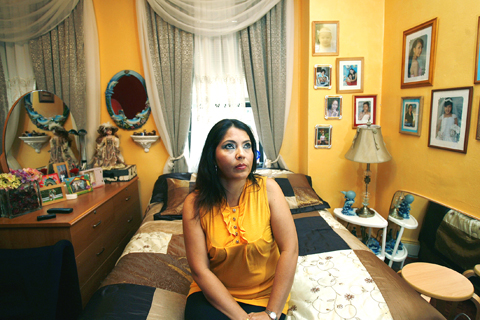As neon lights bathe the dance floor of the darkened nightclub, a group of young women from Latin America sit at tables, sipping water or soda and waiting for men to approach and hand them cash.
For US$2, the women will dance for one song. For US$10, they will dance a set. US$40 buys an hour of their time.
The scene plays out in immigrant neighborhoods across New York City, providing a key source of employment for immigrant women and a haven for men seeking to stave off the loneliness of being far from home. It is a perfectly legal form of entertainment — there is no stripping, but plenty of hand-holding.

PHOTO: AP
But some of the women say the clubs have a darker side. They complain about exploitative management, sexual advances from clients and even violence. A 24-year-old dancer was recently shot and killed in Queens and one of the city’s largest dollar-dance venues is now the target of a federal lawsuit.
For many dancers, the stigma of working at the clubs is the most trying problem.
“Sometimes people or clients say we’re prostitutes, but we’re not. We dance,” said Tania Zarate, a dancer at one club in Queens.

PHOTO: AP
That dancing can veer from prudish to the sensual grind. Some clubs demand that dancers wear skimpy uniforms. Elsewhere, they dress in jeans and T-shirts. Bouncers are often hired to fend off unruly customers or those with straying hands.
Many of the dollar-dance places can’t rightly be called nightclubs. They are bars that just happen to feature dance floors with women who get paid by the dance.
Zarate, 35, who is from Veracruz, Mexico, wore a short jean skirt, white blouse and white tights on a recent summer night. She said she returned to dancing after leaving the job to try her skills in another line of work. But that job ended.
She was not happy to return to work as a dancer.
“To have to come from my country and work this kind of job? No!” she said in Spanish, with a wave of her hand. “Sometimes you dance with a guy and then he doesn’t want to pay up.”
The idea of women dancing with a partner for a song has a long tradition.
During the Depression, men in many big cities could go to “taxi-dance halls” to pay for dances. Back then, each dance cost just a dime, and the women were largely of Eastern European descent.
Today, the woman hail from Mexico, Ecuador, Colombia, the Dominican Republic and elsewhere. They are often single mothers who have become migrant workers to support the families they left behind.
Carla Ramirez, 26, a married mother of three, said she began dancing at a club soon after arriving from her native Ecuador. She said she keeps the job secret from her husband.
“He thinks I work in a restaurant,” she said. “He doesn’t like me drinking or dancing with another man.”
The men she dances with at a nightclub on Roosevelt Avenue in Queens are mostly laborers from Latin America. They are often construction workers, landscapers and restaurant workers. Many come to the clubs still wearing boots and jeans, splattered with paint and mud.
A 41-year-old laborer, who spoke on the condition that he be identified only as Emilio because he didn’t want to be known as a patron of the clubs, said he sometimes spends hundreds of dollars a night on dancing, drinks and female companionship.
“When a man is lonely, he looks for someone who he can talk to and someone he can spend time with,” he explained.
Ramirez said she sometimes worries about safety. “There are times when the guys are drinking and they start to fight and throw bottles,” she said, but adds that the club where she works hires bouncers.
The need for security was highlighted in December when 24-year-old Adriana Valderrama, a dancer at the nearby Tulcingo Cafe, was fatally shot and her dance partner wounded. There have been no arrests in the killing, and detectives believe the gunman fled to Mexico. Messages left for the bar’s owners were not returned.
Dancers can also face the relatively ordinary peril of labor exploitation.
A lawsuit against the Flamingo, a tropical-themed nightclub in Queens, alleges that the bar’s owners failed to pay wages and overtime, subjected the dancers to video surveillance in a dressing room, and required them to pay entry fees of up to US$11, plus fines if they were late for work or missed a day.
Diana Trejos, a former dancer who is one of the plaintiffs in the lawsuit, complained that the women were controlled as if they were employees: They were given schedules, required to have doctors’ notes if they missed work because of illness and required they buy uniforms for theme nights.
“All of these things were controlled,” said Trejos, 40, who is from Colombia.
Attorneys for the owners of the business asked a court to dismiss the complaint, arguing that nothing in the suit was true.
The dancers and their lawyers disagree.
“You can’t call a worker an independent contractor and avoid the requirements under the labor law,” said Elizabeth Wagoner, an attorney for a community organization that is supporting the former Flamingo workers in their lawsuit and has organized protests against the nightclub.
Gary Kushner, an attorney for the Flamingo’s owners, said he asked his clients not to comment. He said they had promised the federal judge they wouldn’t litigate through the media.
Handwritten posters in the window of Flamingo apparently put up by current dancers at the club disputed the former employees’ claims: “We are happy to work in the paradise of Flamingo,” and “They’re against us because they’re not here.”

ANNOUNCEMENT: People who do not comply with the ban after a spoken warning would be reported to the police, the airport company said on Friday Taoyuan International Airport Corp on Friday announced that riding on vehicles, including scooter-suitcases (also known as “scootcases”), bicycles, scooters and skateboards, is prohibited in the airport’s terminals. Those using such vehicles should manually pull them or place them on luggage trolleys, the company said in a Facebook post. The ban intends to maintain order and protect travelers’ safety, as the airport often sees large crowds of people, it said, adding that it has stepped up publicity for the regulation, and those who do not comply after a spoken warning would be reported to the police. The company yesterday said that

NEW YEAR’S ADDRESS: ‘No matter what threats and challenges Taiwan faces, democracy is the only path,’ William Lai said, urging progress ‘without looking back’ President William Lai (賴清德) yesterday urged parties across the political divide to democratically resolve conflicts that have plagued domestic politics within Taiwan’s constitutional system. In his first New Year’s Day address since becoming president on May 20 last year, Lai touched on several issues, including economic and security challenges, but a key emphasis was on the partisan wrangling that has characterized his first seven months in office. Taiwan has transformed from authoritarianism into today’s democracy and that democracy is the future, Lai said. “No matter what threats and challenges Taiwan faces, democracy is the only path for Taiwan,” he said. “The only choice

CORRUPTION: Twelve other people were convicted on charges related to giving illegal benefits, forgery and money laundering, with sentences ranging from one to five years The Yilan District Court yesterday found Yilan County Commissioner Lin Zi-miao (林姿妙) guilty of corruption, sentencing her to 12 years and six months in prison. The Yilan District Prosecutors’ Office in 2022 indicted 10 government officials and five private individuals, including Lin, her daughter and a landowner. Lin was accused of giving illegal favors estimated to be worth NT$2.4 million (US$73,213) in exchange for using a property to conduct activities linked to the 2020 Chinese Nationalist Party (KMT) presidential and legislative election campaigns. Those favors included exempting some property and construction firms from land taxes and building code contraventions that would have required
TECH CORRIDOR: Technology centers and science parks in the south would be linked, bolstering the AI, semiconductor, biotech, drone, space and smart agriculture industries The Executive Yuan yesterday approved a “Southern Silicon Valley” project to promote the development of an artificial intelligence (AI) and semiconductor industry in Chiayi County, Tainan, Pingtung County and Kaohsiung. The plan would build an integrated “S-shaped semiconductor industry corridor” that links technology centers and science parks in the south, Executive Yuan spokesperson Michelle Lee (李慧芝) said yesterday after a Cabinet meeting. The project would bolster the AI, semiconductor, biotech, drone, space and smart agriculture industries, she said. The proposed tech corridor would be supported by government efforts to furnish computing power, workforce, supply chains and policy measures that encourage application and integration